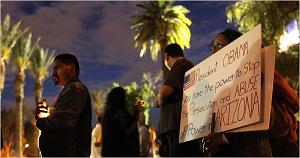WASHINGTON Companies using criminal records or bad credit reports to screen out job applicants might run afoul of anti-discrimination laws as the government steps up scrutiny of hiring policies that can hurt blacks and Hispanics.A blanket refusal to hire workers based on criminal records or credit problems can be illegal if it has a disparate impact on racial minorities, according to the Equal Employment Opportunity Commission. The agency enforces the nation’s employment discrimination laws.”Our sense is that the problem is snowballing because of the technology allowing these checks to be done with a fair amount of ease,” said Carol Miaskoff, assistant legal counsel at the EEOC.
With millions of adults having criminal records – anything from underage drinking to homicide – a growing number of job seekers are having a rough time finding work. And more companies are trying to screen out people with bankruptcies, court judgments or other credit problems just as those numbers have swollen during the recession.Just ask Adrienne Hudson, a single mother who says she was fired from her new job as a bus driver at First Transit in Oakland, Calif., when the company found out she had been convicted seven years earlier for welfare fraud.
Hudson, 44, is fighting back with a lawsuit alleging the company’s hiring practice discriminates against black and Latino job seekers, who have arrest and conviction rates far greater than whites. A spokesman for First Transit said the company does not comment on pending litigation.”People make mistakes,” said Hudson, who is black, “but when they correct their mistake, they should not be punished again outside of the court system.”
Justice Department statistics show that 38 percent of the U.S. prison population is black, compared with about 12 percent of the general population. In 2008, African-Americans were about six times more likely to be incarcerated than whites. The incarceration rate for Latinos was 2.3 times higher than whites.If criminal histories are taken into account, the EEOC says employers must also consider the nature of the job, the seriousness of the offense and how long ago it occurred. For example, it may make sense to disqualify a bank employee with a past conviction for embezzlement, but not necessarily for a DUI.
Most companies tend to be more nuanced when they look at credit reports, weeding out those applicants with bad credit only if they seek senior positions or jobs dealing with money. But if the screening process weeds out more black and Hispanic applicants than whites, an employer needs to show how the credit information is related to the job.
About 73 percent of major employers report that they always check on applicants’ criminal records, while 19 percent do so for select job candidates, according to a 2010 survey by the Society for Human Resource Management.The same survey found that almost half of major companies conduct credit checks for some job candidates, such as those who would be in a position of financial trust. Another 13 percent perform credit checks for all potential workers.
Last fall, the EEOC sent a strong message to employers when it filed a class-action lawsuit against Freeman Companies, a Dallas-based events planning firm, alleging the company discriminated against blacks, Hispanics and males by rejecting job seekers based on credit history and criminal records. Freeman has denied the charges.The growth of online databases and a multimillion dollar background check industry have made it easy for employers to find out reams of information about potential hires. Companies see the checks as another way to weed out unsavory candidates, keep a safe work environment and prevent negligent hiring claims.
“Past indiscretions may be an indicator of future behavior, especially in the criminal context,” said Pamela Devata, a Chicago employment lawyer who has represented companies trying to comply with EEOC’s requirements.Devata said employers nationwide have seen the EEOC become more active in investigating employer hiring practices. The scrutiny has caused many companies to reevaluate their screening process and move to a case-by-case standard.
Ariela Migdal, an attorney with the American Civil Liberties Union’s Women’s Rights Project in New York, said a person might have a blemish that has nothing to do with the job he or she is seeking. And records sometimes are inaccurate or not updated to reflect that someone arrested later had charges dropped or a conviction overturned or expunged, she said.”Somebody with an old conviction that has been rehabilitated doesn’t have any greater likelihood of committing a crime, so its irrational to use that against them,” Migdal said.
Ron Heintzman, president of the Amalgamated Transit Union, said he’s seen dozens of job candidates disqualified “for reasons that were just ridiculous.” His union, with 13,000 members in First Transit, is paying for the lawsuit that Hudson filed last month against the company which operates bus service in Oakland and several other major cities.
In Hudson’s case, she was fired after just two days on the job as a bus driver because of a 7-year-old felony welfare fraud conviction. The conviction was later dismissed under California law, but her lawsuit, filed in federal court last month, claims the company has a policy to deny employment no matter how old the conviction, the applicant’s prior work history or whether it is related to the job.
(This version CORRECTS name of American Civil Liberties Union.)(AP)




